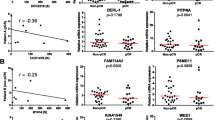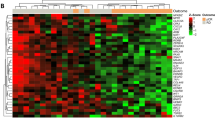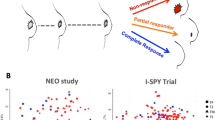Abstract
Background
In breast cancer, the identification of accurate predictors of tumor response to neoadjuvant chemotherapy is of key importance, but none of the critical markers have been validated to date. We attempted to identify potent marker genes genome-wide, and we developed a prediction model for individual response to epirubicin (EPI)/cyclophosphamide (CPM) combination chemotherapy (EC).
Methods
From 10 human breast cancer cell lines, genes whose expression levels correlated with cytotoxicities of EPI and CPM were chosen through comprehensive gene expression analysis followed by correlation–confirmation study of the quantified expression levels analyzed by real-time reverse transcription polymerase chain reaction (RT-PCR).
Results
We finally selected a total of 4 genes (ANXA1 and PRKCA for EPI; DUSP2 and SERPINA3 for CPM) as reliable prediction markers. Using quantified expression data of genes in 18 tumor samples, we performed multiple linear regression analysis to establish the best linear model that could convert the quantified expression data to show tumor response to the EC therapy (the ratio of tumor size to the baseline, %). Outliers were identified by referring to the value of AIC (Akaike’s information criterion) for each sample (AIC/sample) or checking residuals graphically. The multiple linear regression analysis of the selected genes yielded 2 highly predictive formulae for the tumor response: one used all of the genes except SERPINA3 (R = 0.8348, AIC/sample = 4.9182) and the other used all of the 4 genes (R = 0.8224, AIC/sample = 5.0730).
Conclusions
A study to validate the predictive values of the selected 4 genes is now planned, along with research to determine their functional roles.




Similar content being viewed by others
References
Horiguchi J. New trends in primary systemic therapy for breast cancer. Breast Cancer 2010; Epub ahead of print, doi:10.1007/s12282-010-0243-4.
Benson JR, Jatoi I, Keisch M, Esteva FJ, Makris A, Jordan VC. Early breast cancer. Lancet. 2009;373:1463–79.
Kinoshita T. Preoperative therapy: recent findings. Breast Cancer 2010; Epub ahead of print doi:10.1007/s12282-010-0227-4.
Untch M, von Minckwitz G. Recent advances in systemic therapy: advances in neoadjuvant (primary) systemic therapy with cytotoxic agents. Breast Cancer Res. 2009;11:203.
Colleoni M, Viale G, Goldhirsch A. Lessons on responsiveness to adjuvant systemic therapies learned from the neoadjuvant setting. Breast. 2009;18(Suppl 3):S137–40.
Beasley GM, Olson JA Jr. What’s new in neoadjuvant therapy for breast cancer? Adv Surg. 2010;44:199–228.
Gluz O, Liedtke C, Gottschalk N, Pusztai L, Nitz U, Harbeck N. Triple-negative breast cancer—current status and future directions. Ann Oncol. 2009;20:1913–27.
Shenoy HG, Peter MB, Masannat YA, Dall BJ, Dodwell D, Horgan K. Practical advice on clinical decision making during neoadjuvant chemotherapy for primary breast cancer. Surg Oncol. 2009;18:65–71.
Liu SV, Melstrom L, Yao K, Russell CA, Sener SF. Neoadjuvant therapy for breast cancer. J Surg Oncol. 2010;101:283–91.
Munro AF, Cameron DA, Bartlett JM. Targeting anthracyclines in early breast cancer: new candidate predictive biomarkers emerge. Oncogene. 2010;29:5231–40.
Bartlett JM, Munro AF, Dunn JA, McConkey C, Jordan S, Twelves CJ, et al. Predictive markers of anthracycline benefit: a prospectively planned analysis of the UK National Epirubicin Adjuvant Trial (NEAT/BR9601). Lancet Oncol. 2010;11:266–74.
Marsh S, Liu G. Pharmacokinetics and pharmacogenomics in breast cancer chemotherapy. Adv Drug Deliv Rev. 2009;61:381–7.
Baek HM, Chen JH, Nie K, Yu HJ, Bahri S, Mehta RS, et al. Predicting pathologic response to neoadjuvant chemotherapy in breast cancer by using MR imaging and quantitative 1H MR spectroscopy. Radiology. 2009;251:653–62.
Tanioka M, Shimizu C, Yonemori K, Yoshimura K, Tamura K, Kouno T, et al. Predictors of recurrence in breast cancer patients with a pathologic complete response after neoadjuvant chemotherapy. Br J Cancer. 2010;103:297–302.
Chuthapisith S, Eremin JM, Eremin O. Predicting response to neoadjuvant chemotherapy in breast cancer: molecular imaging, systemic biomarkers and the cancer metabolome (Review). Oncol Rep. 2008;20:699–703.
Tanaka T, Tanimoto K, Otani K, Satoh K, Ohtaki M, Yoshida K, et al. Concise prediction models of anticancer efficacy of 8 drugs using expression data from 12 selected genes. Int J Cancer. 2004;11:617–26.
Komatsu M, Hiyama K, Tanimoto K, Yunokawa M, Otani K, Ohtaki M, et al. Prediction of individual response to platinum/paclitaxel combination using novel marker genes in ovarian cancers. Mol Cancer Ther. 2006;5:767–75.
Shimokuni T, Tanimoto K, Hiyama K, Otani K, Ohtaki M, Hihara J, et al. Chemosensitivity prediction in esophageal squamous cell carcinoma: novel marker genes and efficacy-prediction formulae using their expression data. Int J Oncol. 2006;28:1153–62.
Fumoto S, Shimokuni T, Tanimoto K, Hiyama K, Otani K, Ohtaki M, et al. Selection of a novel drug-response predictor in esophageal cancer: a novel screening method using microarray and identification of IFITM1 as a potent marker gene of CDDP response. Int J Oncol. 2008;32:413–23.
Nishiyama M, Eguchi H. Pharmacokinetics and pharmacogenomics in gastric cancer chemotherapy. Adv Drug Deliv Rev. 2009;61:402–7.
Staunton JE, Slonim DK, Coller HA, Tamayo P, Angelo MJ, Park J, et al. Chemosensitivity prediction by transcriptional profiling. Proc Natl Acad Sci U S A. 2001;98:10787–92.
McLeod HL, Evans WE. Pharmacogenomics: unlocking the human genome for better drug therapy. Annu Rev Pharmacol Toxicol. 2001;41:101–21.
Rousseeuw PJ. Least median of squares regression. J Am Stat Assoc. 1984;79:871–80.
Turaga K, Acs G, Laronga C. Gene expression profiling in breast cancer. Cancer Control. 2010;17:177–82.
Perou CM, Børresen-Dale AL. Systems biology and genomics of breast cancer. Cold Spring Harb Perspect Biol 2010; Epub ahead of print doi:10.1101/cshperspect.a003293.
Ou K, Yu K, Kesuma D, Hooi M, Huang N, Chen W, et al. Novel breast cancer biomarkers identified by integrative proteomic and gene expression mapping. J Proteome Res. 2008;7:1518–28.
Bergman PJ, Gravitt KR, Ward NE, Beltran P, Gupta KP, O’Brian CA. Potent induction of human colon cancer uptake of chemotherapeutic drugs by N-myristoylated protein kinase C-alpha (PKC-alpha) pseudosubstrate peptides through a P-glycoprotein-independent mechanism. Invest New Drugs. 1997;15:311–8.
Gravitt KR, Ward NE, Fan D, Skibber JM, Levin B, O’Brian CA. Evidence that protein kinase C-alpha activation is a critical event in phorbol ester-induced multiple drug resistance in human colon cancer cells. Biochem Phamacol. 1994;48:375–81.
Chen Y, Yu G, Yu D, Zhu M. PKCalpha-induced drug resistance in pancreatic cancer cells is associated with transforming growth factor-beta1. J Exp Clin Cancer Res. 2010;29:104.
Bermudez O, Pagès G, Gimond C. The dual-specificity MAP kinase phosphatases: critical roles in development and cancer. Am J Physiol Cell Physiol. 2010;299:C189–202.
Baker C, Belbin O, Kalsheker N, Morgan K. SERPINA3 (aka alpha-1-antichymotrypsin). Front Biosci. 2007;12:2821–35.
Cimino D, Fuso L, Sfiligoi C, Biglia N, Ponzone R, Maggiorotto F, et al. Identification of new genes associated with breast cancer progression by gene expression analysis of predefined sets of neoplastic tissues. Int J Cancer. 2008;123:1327–38.
Pohl A, Lurje G, Manegold PC, Lenz HJ. Pharmacogenomics and -genetics in colorectal cancer. Adv Drug Deliv Rev. 2009;61:375–80.
Ruzzo A, Graziano F, Kawakami K, Watanabe G, Santini D, Catalano V, et al. Pharmacogenetic profiling and clinical outcome of patients with advanced gastric cancer treated with palliative chemotherapy. J Clin Oncol. 2006;24:1883–91.
Lu JW, Gao CM, Wu JZ, Cao HX, Tajima K, Feng JF. Polymorphism in the 3′-untranslated region of the thymidylate synthase gene and sensitivity of stomach cancer to fluoropyrimidine-based chemotherapy. J Hum Genet. 2006;51:155–60.
Ichikawa W, Takahashi T, Suto K, Shirota Y, Nihei Z, Shimizu M, et al. Simple combinations of 5-FU pathway genes predict the outcome of metastatic gastric cancer patients treated by S-1. Int J Cancer. 2006;119:1927–33.
Conflict of interest
Toshiaki Saeki received honoraria (such as lecture fees) from Chugai Pharmaceutical Co. Ltd. and research funding from Pfizer Japan Inc. (prediction of chemosensitivity for breast cancer) and from Chugai Pharmaceutical Co. Ltd. (QOL of breast cancer patients).
Author information
Authors and Affiliations
Corresponding author
About this article
Cite this article
Sano, H., Wada, S., Eguchi, H. et al. Quantitative prediction of tumor response to neoadjuvant chemotherapy in breast cancer: novel marker genes and prediction model using the expression levels. Breast Cancer 19, 37–45 (2012). https://doi.org/10.1007/s12282-011-0263-8
Received:
Accepted:
Published:
Issue Date:
DOI: https://doi.org/10.1007/s12282-011-0263-8




